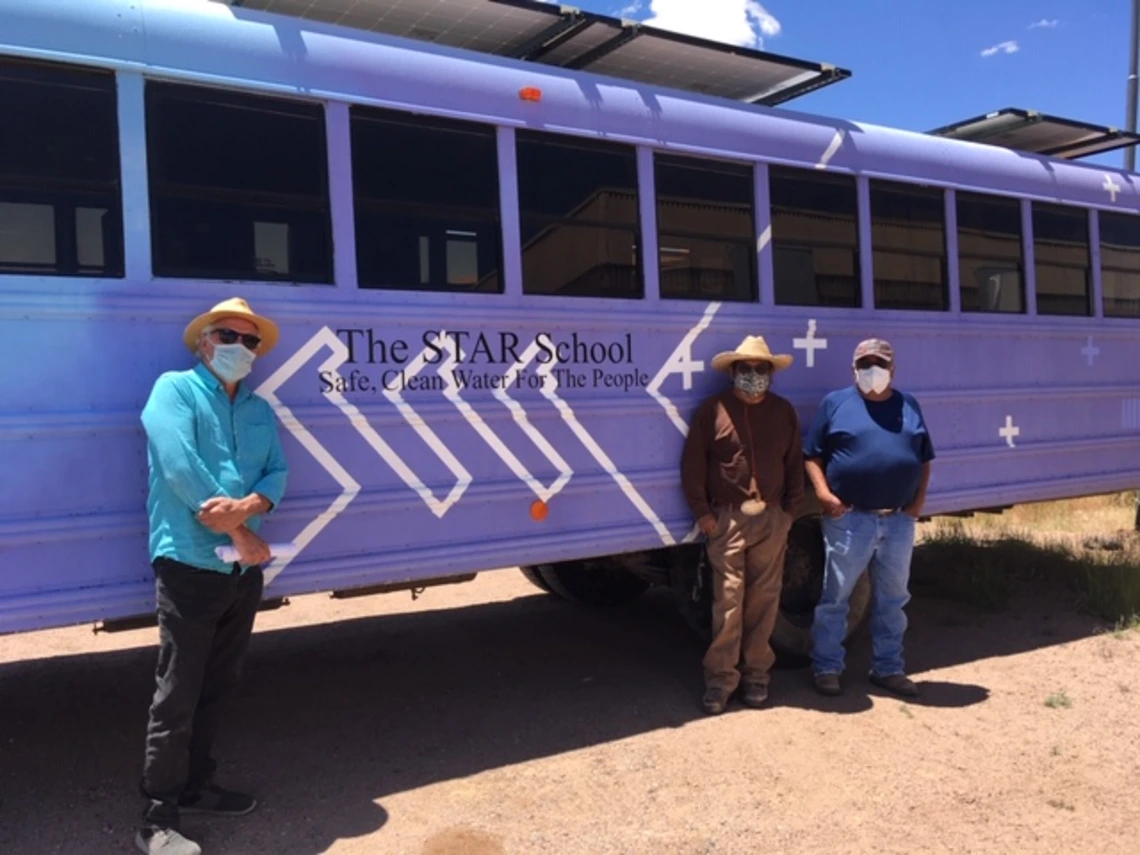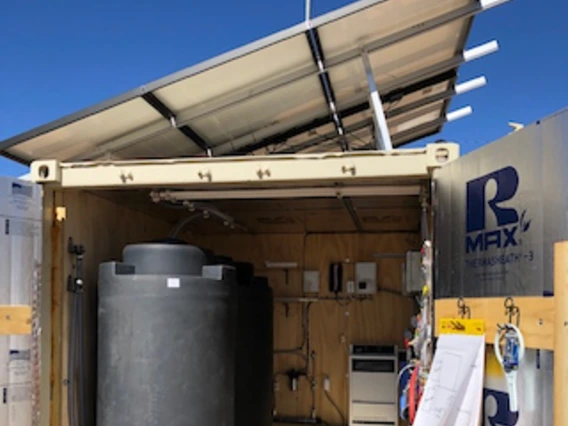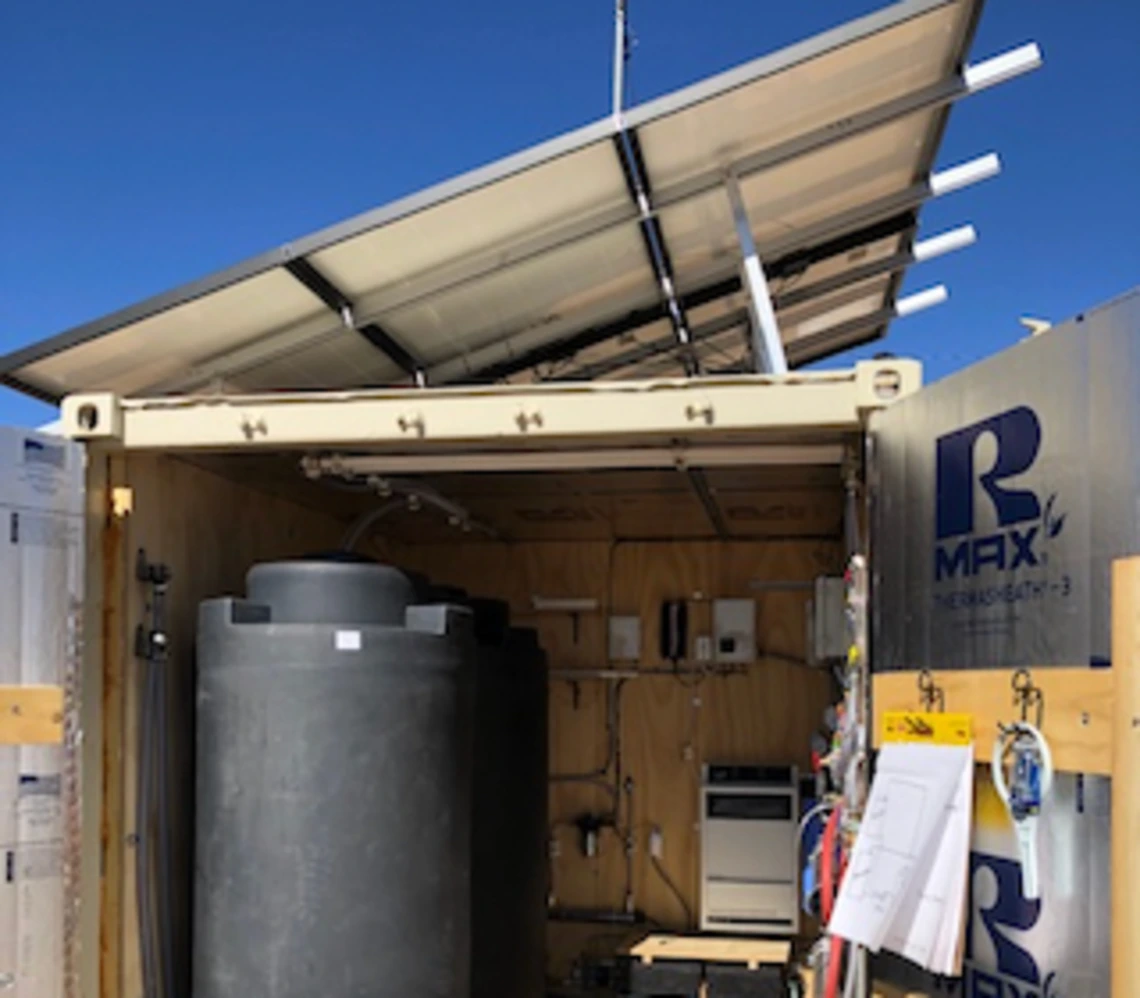Two Demo Water Filtration Systems Were Successfully Installed on Navajo Nation and Hopi Tribe

The Air to Water Technology Demonstration Site in Navajo Nation & the Water Bus–Water Treatment System in Shipaulovi, Hopi Tribe projects led by Jing Luo, Apex Applied Technology, Inc., and Mark Sorensen, STAR School (Painted Desert Demonstrations Projects, Inc.) and funded by the Haury Program have provided COVID-19 rapid relief for members of the Navajo Nation and Hopi Tribe. Rapid relief efforts included water quality testing, delivery and installation of a mobile (using "water bus") and a stationary water filtration system, hands-on training on system operation and maintenance, and a technical review of air-to-water technologies located near the project area.
 Lack of clean and safe drinking water is a long-term issue facing tribal members on the Navajo and Hopi Reservations. It is estimated that 30-50% of residents in the Navajo Nation do not have running water or commercial power. Often times, it is not physically or economically feasible to connect these houses to a centralized water supply or commercial power grid. Through a decentralized approach, Luo and Sorensen developed an off-grid water filtration system (the "Water Box") that is 100% automatic and can be installed at any groundwater well site to purify water and provide safe drinking water to locals. The "water box" is the only off-grid water filtration system that has been successfully tested in the Navajo Nation for over 5 years. The system is 100% solar-powered and automatic. Recently, the control system received a patent and will likely be commercialized in the near future. The team strives to provide holistic solutions to socially disadvantaged communities. The water filtration system was installed in September 2020 in a retired school bus, also known as the “Water Bus”. The “Water Bus” was used to filter water in the Shipaulovi Village of Hopi Tribe where local water sources are known to have elevated arsenic concentration and a few other water contaminants.
Lack of clean and safe drinking water is a long-term issue facing tribal members on the Navajo and Hopi Reservations. It is estimated that 30-50% of residents in the Navajo Nation do not have running water or commercial power. Often times, it is not physically or economically feasible to connect these houses to a centralized water supply or commercial power grid. Through a decentralized approach, Luo and Sorensen developed an off-grid water filtration system (the "Water Box") that is 100% automatic and can be installed at any groundwater well site to purify water and provide safe drinking water to locals. The "water box" is the only off-grid water filtration system that has been successfully tested in the Navajo Nation for over 5 years. The system is 100% solar-powered and automatic. Recently, the control system received a patent and will likely be commercialized in the near future. The team strives to provide holistic solutions to socially disadvantaged communities. The water filtration system was installed in September 2020 in a retired school bus, also known as the “Water Bus”. The “Water Bus” was used to filter water in the Shipaulovi Village of Hopi Tribe where local water sources are known to have elevated arsenic concentration and a few other water contaminants.
The "Water Box" is capable of providing clean and safe drinking water to small communities by generating 500-1000 gallons of water per day. Concerns of environmental contamination in water sources of the Shipaulovi Village have been reduced greatly through this rapid relief effort. The project team not only demonstrated the water filtration system, but they also provided hands-on training and education relating to the operation and management of the system. By doing so, the project team has enabled local members of the community to continue the promotion of self-resilience and reliance.
As part of the Haury effort, the Zero Mass Water SOURCE Hydro-Panel system (an "air-to-water" technology) has been evaluated for its water production efficiency in Northern Arizona. The final report can be downloaded from AATech's program website. The project team will continue to develop creative and effective solutions to address water scarcity issues in tribal communities. https://aatechsolar.com/agnese-nelms-haury
The development of community trust is highly important when working in Native American communities. The project team has a long history and track record of successfully working in the tribal communities of Navajo Nation and Hopi Tribe. It has to be a persistent effort. In the past ten years, the STAR School, Apex Applied Technology, Inc. (AATech), and groups led by Mr. Trent Teegerstrom and Dr. Ed Franklin have delivered over 10successful programs in Navajo Nation alone. Being able to demonstrate long-term commitment and generate lasting results over time is essential to the success of our programs.
To sustain the work done here, the project team will remain in contact with local operators within this community. The project team is also working to continue the development of water filtration systems to be placed in other Navajo Nation and Hopi communities. Other efforts and projects are underway to increase clean and safe drinking water access in these tribal communities. In addition, the project team will continue to provide engineering services and technical assistance to solve the water issues on tribal lands.


